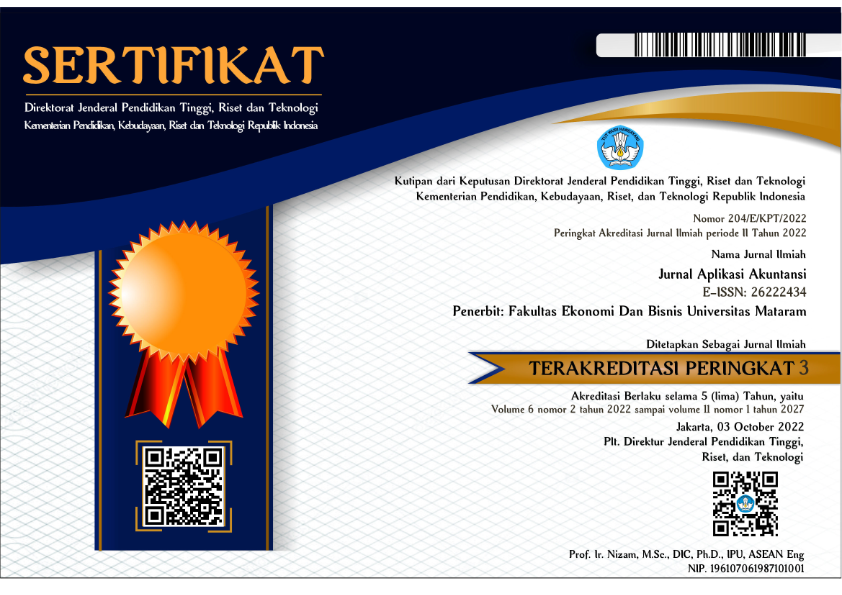THE IMPLICATION OF GREEN ENTREPRENEURSHIP AND GREEN INNOVATION TO ENHANCE SMES' PERFORMANCE
DOI:
https://doi.org/10.29303/jaa.v10i1.673Keywords:
Green Entrepreneurship, Green Innovation, MSMEs Performance, MedanAbstract
This study looks into how starting businesses with eco-friendly ideas and creating new green technologies can affect the success of small and medium-sized enterprises. The research was conducted using quantitative and direct survey methods with a sample of 103 MSMEs. After evaluating model fit, hypothesis testing procedures were performed using Structural Equation Modeling (SEM). Throughout the study timeframe, the impact of green entrepreneurship on green innovation was significant. Nonetheless, no statistical correlation was found between green entrepreneurship and the performance of MSMEs. This research discovered that green entrepreneurship positively and significantly influences green innovation. Nevertheless, this effect did not affect the performance of MSME businesses. Numerous studies demonstrate that adopting sustainable business practices can enhance the performance of MSMEs. Conversely, the findings show a significant effect of green innovation on achieving MSMEs. The implications of this research are a reference for MSMEs. They can use this to improve their performance and have a competitive advantage.
References
Abbas, J., & Khan, S. M. (2023). Green knowledge management and organizational green culture: an interaction for organizational green innovation and green performance. Journal of Knowledge Management, 27(7), 1852–1870. https://doi.org/10.1108/JKM-03-2022-0156
Ahmad, S. (2015). Green Human Resource Management: Policies and practices. Cogent Business and Management, 2(1), 1–13. https://doi.org/10.1080/23311975.2015.1030817
Al-Fadhel, H., Al-Jalahma, A., Al-Muhanadi, M., Asad, M., & Sheikh, U. A. (2022). Management of Higher Education Institutions in the GCC Countries during the Emergence of COVID-19: A Review of Opportunities, Challenges, and a Way Forward. International Journal of Learning in Higher Education, 29(1), 83–97. https://doi.org/10.18848/2327-7955/CGP/V29I01/83-97
AlQershi, N. A., Saufi, R. B. A., Yaziz, M. F. B. A., Ramayah, T., Muhammad, N. M. N., & Yusoff, M. N. H. Bin. (2023). The relationship between green entrepreneurship, human capital and business sustainability in Malaysian large manufacturing firms: An empirical study. Technological Forecasting and Social Change, 192, 122529. https://doi.org/10.1016/J.TECHFORE.2023.122529
Alvarez-Risco, A., Mlodzianowska, S., García-Ibarra, V., Rosen, M. A., & Del-Aguila-Arcentales, S. (2021). Factors affecting green entrepreneurship intentions in business university students in covid-19 pandemic times: Case of ecuador. Sustainability (Switzerland), 13(11). https://doi.org/10.3390/SU13116447
Alwakid, W., Aparicio, S., & Urbano, D. (2020). Cultural antecedents of green entrepreneurship in Saudi Arabia: An institutional approach. Sustainability (Switzerland), 12(9). https://doi.org/10.3390/SU12093673
Asad, M., Aledeinat, M., Majali, T., Almajali, D. A., & Shrafat, F. D. (2023). Mediating role of green innovation and moderating role of resource acquisition with firm age between green entrepreneurial orientation and performance of entrepreneurial firms. Cogent Business and Management, 11(1). https://doi.org/10.1080/23311975.2023.2291850
Asadi, S., OmSalameh Pourhashemi, S., Nilashi, M., Abdullah, R., Samad, S., Yadegaridehkordi, E., Aljojo, N., & Razali, N. S. (2020). Investigating influence of green innovation on sustainability performance: A case on Malaysian hotel industry. Journal of Cleaner Production, 258. https://doi.org/10.1016/J.JCLEPRO.2020.120860
Asif, M. U., Asad, M., Kashif, M., & Haq, M. A. U. (2021). Knowledge Exploitation and Knowledge Exploration for Sustainable Performance of Smes. 2021 3rd International Sustainability and Resilience Conference: Climate Change, 29–34. https://doi.org/10.1109/IEEECONF53624.2021.9668135
Barbieri, N., Marzucchi, A., & Rizzo, U. (2023). Green technologies, interdependencies, and policy. Journal of Environmental Economics and Management, 118. https://doi.org/10.1016/j.jeem.2023.102791
Barney, J. (1991). Firm Resources and Sustained Competitive Advantage. Journal of Management, 17(1), 99–120. https://doi.org/10.1177/014920639101700108
Chang, C. H. (2011). The Influence of Corporate Environmental Ethics on Competitive Advantage: The Mediation Role of Green Innovation. Journal of Business Ethics, 104(3), 361–370. https://doi.org/10.1007/s10551-011-0914-x
Chen, F., Zeng, X., & Guo, X. (2024). Green finance, climate change, and green innovation: Evidence from China. Finance Research Letters, 63, 105283. https://doi.org/10.1016/J.FRL.2024.105283
Chen, S., Shen, W., Qiu, Z., Liu, R., & Mardani, A. (2023). Who are the green entrepreneurs in China? The relationship between entrepreneurs’ characteristics, green entrepreneurship orientation, and corporate financial performance. Journal of Business Research, 165, 113960. https://doi.org/10.1016/J.JBUSRES.2023.113960
Day, G. S. (1994). The Capabilities of Market-Driven Organizations. Journal of Marketing, 58(4), 37–52. https://doi.org/10.1177/002224299405800404
Duque-Grisales, E., Aguilera-Caracuel, J., Guerrero-Villegas, J., & García-Sánchez, E. (2020). Does green innovation affect the financial performance of Multilatinas? The moderating role of ISO 14001 and R&D investment. Business Strategy and the Environment, 29(8), 3286–3302. https://doi.org/10.1002/BSE.2572
Ebrahimi, P., & Mirbargkar, S. M. (2017). Green entrepreneurship and green innovation for SME development in market turbulence. Eurasian Business Review, 7(2), 203–228. https://doi.org/10.1007/S40821-017-0073-9
Gürlek, M., & Tuna, M. (2018). Reinforcing competitive advantage through green organizational culture and green innovation. Service Industries Journal, 38(7–8), 467–491. https://doi.org/10.1080/02642069.2017.1402889
Hsu, C. C., Quang-Thanh, N., Chien, F. S., Li, L., & Mohsin, M. (2021). Evaluating green innovation and performance of financial development: mediating concerns of environmental regulation. Environmental Science and Pollution Research, 28(40), 57386–57397. https://doi.org/10.1007/S11356-021-14499-W
Huang, X., Chau, K. Y., Tang, Y. M., & Iqbal, W. (2022). Business Ethics and Irrationality in SME During COVID-19: Does It Impact on Sustainable Business Resilience? Frontiers in Environmental Science, 10. https://doi.org/10.3389/FENVS.2022.870476
Javaid, M., Haleem, A., Pratap Singh, R., Khan, S., & Suman, R. (2022). Sustainability 4.0 and its applications in the field of manufacturing. Internet of Things and Cyber-Physical Systems, 2, 82–90. https://doi.org/10.1016/J.IOTCPS.2022.06.001
Lin, W. L., Cheah, J. H., Azali, M., Ho, J. A., & Yip, N. (2019). Does firm size matter? Evidence on the impact of the green innovation strategy on corporate financial performance in the automotive sector. Journal of Cleaner Production, 229, 974–988. https://doi.org/10.1016/J.JCLEPRO.2019.04.214
Lin, Y. H., & Chen, H. C. (2018). Critical factors for enhancing green service innovation: Linking green relationship quality and green entrepreneurial orientation. Journal of Hospitality and Tourism Technology, 9(2), 188–203. https://doi.org/10.1108/JHTT-02-2017-0014
Lotfi, M., Yousefi, A., & Jafari, S. (2018). The effect of emerging green market on green entrepreneurship and sustainable development in knowledge-based companies. Sustainability (Switzerland), 10(7). https://doi.org/10.3390/SU10072308
Mankgele, K. P. (2023). Green Entrepreneurial Self-efficacy and Environmental Performance of SMEs: Mediating and Moderating Role of Green Innovation and Green Purchase Behaviour. Global Business and Finance Review, 28(6), 48–58. https://doi.org/10.17549/GBFR.2023.28.6.48
Meng, Q., Peng, T., Song, X., & Wang, S. (2024). Green innovation and IPO return: Evidence from China. International Review of Economics & Finance, 93, 660–677. https://doi.org/10.1016/J.IREF.2024.03.043
Nasution, H. N., & Mavondo, F. T. (2008). Organisational capabilities: Antecedents and implications for customer value. European Journal of Marketing, 42(3–4), 477–501. https://doi.org/10.1108/03090560810853020
Nasution, H. N., Mavondo, F. T., Matanda, M. J., & Ndubisi, N. O. (2011). Entrepreneurship: Its relationship with market orientation and learning orientation and as antecedents to innovation and customer value. Industrial Marketing Management, 40(3), 336–345. https://doi.org/10.1016/j.indmarman.2010.08.002
Ndubisi, N. O., & Iftikhar, K. (2012). Relationship between entrepreneurship, innovation and performance: Comparing small and medium-size enterprises. Journal of Research in Marketing and Entrepreneurship, 14(2), 214–236. https://doi.org/10.1108/14715201211271429
Prokopim. (2023). BERITA | Di Bawah Kepemimpinan Bobby Nasution, Sudah 1.875 Pelaku UMKM Dibina. https://portal.pemkomedan.go.id/berita/di-bawah-kepemimpinan-bobby-nasution-sudah-1875-pelaku-umkm-dibina__read3330.html
Rennings, K. (2000). Redefining innovation - Eco-innovation research and the contribution from ecological economics. Ecological Economics, 32(2), 319–332. https://doi.org/10.1016/S0921-8009(99)00112-3
Rexhepi, G., Kurtishi, S., & Bexheti, G. (2013). Corporate Social Responsibility (CSR) and Innovation–The Drivers of Business Growth? Procedia - Social and Behavioral Sciences, 75, 532–541. https://doi.org/10.1016/j.sbspro.2013.04.058
Saipidinov, I. M., Ajibekova, A. T., Artykbaeva, F. T., & Ostrovskaya, V. N. (2023). Improvement of Green Entrepreneurship Planning in Digital Economy Markets with the Help of Big Data to Increase Climate Resilience. Springer Climate, Part F1853, 153–159. https://doi.org/10.1007/978-3-031-45830-9_17/COVER
Shahzad, M., Qu, Y., Ur Rehman, S., Zafar, A. U., Ding, X., & Abbas, J. (2020). Impact of knowledge absorptive capacity on corporate sustainability with mediating role of CSR: analysis from the Asian context. Journal of Environmental Planning and Management, 63(2), 148–174. https://doi.org/10.1080/09640568.2019.1575799
Singh, S. K., Gupta, S., Busso, D., & Kamboj, S. (2021). Top management knowledge value, knowledge sharing practices, open innovation and organizational performance. Journal of Business Research, 128, 788–798. https://doi.org/10.1016/J.JBUSRES.2019.04.040
Suchek, N., Fernandes, C. I., Kraus, S., Filser, M., & Sjögrén, H. (2021). Innovation and the circular economy: a systematic literature review. Bus Strateg Environ, 30(8), 3686–3702. https://doi.org/10.1002/bse.2834
Sulaiman, M. A. B. A., Asad, M., Ismail, M. Y., & Shabbir, M. S. (2023). Catalyst Role of University Green Entrepreneurial Support Promoting Green Entrepreneurial Inclinations Among Youth: Empirical Evidence from Oman. International Journal of Professional Business Review, 8(8), e02723. https://doi.org/10.26668/BUSINESSREVIEW/2023.V8I8.2723
Ta’Amnha, M. A., Al-Qudah, S., Asad, M., Magableh, I. K., & Riyadh, H. A. (2024). Moderating role of technological turbulence between green product innovation, green process innovation and performance of SMEs. Discover Sustainability, 5(1), 1–16. https://doi.org/10.1007/S43621-024-00522-W/TABLES/3
Ta’Amnha, M. A., Magableh, I. K., Asad, M., & Al-Qudah, S. (2023). Open innovation: The missing link between synergetic effect of entrepreneurial orientation and knowledge management over product innovation performance. Journal of Open Innovation: Technology, Market, and Complexity, 9(4). https://doi.org/10.1016/J.JOITMC.2023.100147
Truong, Y., & Nagy, B. G. (2021). Nascent ventures’ green initiatives and angel investor judgments of legitimacy and funding. Small Business Economics, 57(4), 1801–1818. https://doi.org/10.1007/S11187-020-00373-5
Ullah, Z., Álvarez-Otero, S., Sulaiman, M. A. B. A., Sial, M. S., Ahmad, N., Scholz, M., & Omhand, K. (2021). Achieving organizational social sustainability through electronic performance appraisal systems: The moderating influence of transformational leadership. Sustainability (Switzerland), 13(10). https://doi.org/10.3390/SU13105611
Waqas, M., Honggang, X., Ahmad, N., Khan, S. A. R., & Iqbal, M. (2021). Big data analytics as a roadmap towards green innovation, competitive advantage and environmental performance. Journal of Cleaner Production, 323. https://doi.org/10.1016/j.jclepro.2021.128998
Xie, Z., Qalati, S. A., Limón, M. L. S., Sulaiman, M. A. B. A., & Qureshi, N. A. (2023). Understanding factors influencing healthcare workers’ intention towards the COVID-19 vaccine. PLoS ONE, 18(7 July). https://doi.org/10.1371/JOURNAL.PONE.0286794
Xu, N., Fan, X., & Hu, R. (2022). Adoption of Green Industrial Internet of Things to Improve Organizational Performance: The Role of Institutional Isomorphism and Green Innovation Practices. Frontiers in Psychology, 13. https://doi.org/10.3389/FPSYG.2022.917533
Yang, J., Wang, Y., Gu, Q., & Xie, H. (2022). The antecedents and consequences of green purchasing: an empirical investigation. Benchmarking, 29(1), 1–21. https://doi.org/10.1108/BIJ-11-2020-0564
Zameer, H., Wang, Y., Yasmeen, H., & Mubarak, S. (2022). Green innovation as a mediator in the impact of business analytics and environmental orientation on green competitive advantage. Management Decision, 60(2), 488–507. https://doi.org/10.1108/MD-01-2020-0065
Zhang, D., Rong, Z., & Ji, Q. (2019). Green innovation and firm performance: Evidence from listed companies in China. Resources, Conservation and Recycling, 144, 48–55. https://doi.org/10.1016/j.resconrec.2019.01.023
Downloads
Published
How to Cite
Issue
Section
License
Copyright (c) 2025 Pasca Dwi Putra, Andri Zainal, Khairunnisa Harahap, Ivo Selvia Agusti, Hendra Saputra, Roza Thohiri, Fenny Afrida

This work is licensed under a Creative Commons Attribution-ShareAlike 4.0 International License.









